
The word landscape first appeared printed in English in 1603 and has origins in Middle Dutch ( landscap ) meaning region, German ( landschaft ) and Old Norse ( landskap ). A previous formation in English was landskip. Also note that the suffix –ship is closely tied to –schaft meaning constitution, condition or shape. 2) the branch of painting, photography, etc, dealing with such pictures 3) a view, prospect or vista of scenery or tract of land with its distinguishing characteristics either natural and/or man made. As verb, landscape is: 4) the act of shaping land so as to make it more attractive or useful. Weekley, Ernest, An Etymological Dictionary of Modern English, London, 1921.Īs noun, landscape is: 1) a picture, sketch, etching, photograph, map or other representation of inland scenery, as of prairie, woodland, mountains, etc. Tuan, Yi-Fu, Space and Place: The Perspective of Experience, Minnesota, 1977. Schivelbusch, Wolfgang, The Railway Journey, Berkeley, California, 1977. Meyrowitz, Joshua, No Sense of Place: The Impact of Electronic Media on Social Behavior, New York, 1985. Mitchell, W.J.T., (ed.), Landscape and Power, Chicago, 1994. Mitchell, William J., City of Bits, Cambridge, Mass, 1995. McLuhan, Marshall, Understanding Media, New York, 1964. Hall, Lee, Olmsted's America, Boston, 1995. (ed.), Chambers Dictionary of Etymology, Edinburgh, 1988.Ĭampanella, Thomas J., Cities from the Sky, New York, 2001.Ĭonzen, Michael, (ed.), The Making of the American Landscape, London, 1990.ĭaniels, Stephen, "The Politics of Landscape in European Art," in The Bulfinch Guide to Art History, West, Shearer, (ed.), Boston, 1996. The word is used in its general sense in a letter of Sir Walter Scott (1796).Adams, Ann, "Competing Communities in the 'Great Bog of Europe'-Identity and Seventeenth-Century Dutch Landscape Paining," from: Mitchell, W.J.T., (ed.), Landscape and Power, Chicago, 1994.Īdams, Steven & Robins, Anna Gruetzner, Gendering Landscape Art, New Brunswick, NJ, 2000.Īppleton, Jay, The Experience of Landscape, London, 1975.īarnhart, Robert K. Anyone kissing the stone is supposed to become skillful in flattering and coaxing. 1766, Lady Blarny (for Blarney), a smooth-talking flatterer in Goldsmith's the Vicar of Wakefield, her name being a literary contrivance in allusion to Blarney Stone, a stone in a castle near Cork, Ireland. Sample entry from the Chambers Etymological Dictionary: blarney n. First published as the Barnhart Etymological Dictionary, the Chambers Dictionary of Etymology offers a unique combination of approachability and authoritativeness in an accessible single-volume format, making it an essential etymological resource for the expert, and a fascinating reference for the general reader.


For many years academics, wordsmiths, crossword lovers, and language enthusiasts of all stripes have turned to this celebrated volume as their reference of choice in lexical matters. Over 30,000 detailed entries trace words back to their Proto-Germanic or Indo-European roots, and include words borrowed from other languages, as well as the sources and dates of their first recorded use.

This fascinating dictionary explores the development of meaning, spelling, and pronunciation of over 25,000 English words. How are the words 'door' German 'Tr' and Sanskrit 'dvar' related? When did the word Blarney first appear in print? What's the linguistic history of the word 'history'? The Chambers Etymological Dictionary holds all the answers for any person curious about the origins of the words they use, and how these words have changed over time.


 0 kommentar(er)
0 kommentar(er)
